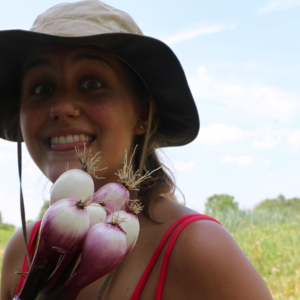Spring semester senior year has been filled with open-ended questions: What’s my plan post-graduation? Where am I going to live? How do I apply to jobs without knowing where I’ll settle?
There’s a lot of pressure to be employed before graduation, but if I’ve learned anything from the job application process, the expectation to be employed by May isn’t realistic across all fields. For example, many jobs in the media industry have fast turnaround rates and most applicants are expected to start working immediately after they’re hired (if they’re hired). Those who are in this position, like myself, are left in limbo. To apply or not to apply, to preemptively creep on LinkedIn or not to. I, like many others, am having a hard time feeling productive when there is so much uncertainty.

On a more positive note, I present to you a solution that can bridge the gap between graduation and full-time employment: farming. I imagine this will get a couple eye-rolls. After four years of earning a B.A. in Communications, students aren’t necessarily jumping to get their hands and knees dirty in soil and spend countless hours under the beaming summer sun. They’re also probably expecting a living-wage, which farming often cannot promise. But, if you have some financial flexibility and time to explore, I encourage you to give farming a try before fully immersing in the job search.
Why farming?
Our generation desperately needs to reconnect with the food we eat. We claim to be “foodies” and obsess over food Instagram accounts, but we have little appreciation for where our food is coming from and how. We often gravitate toward labels and signs that read “organic” or “farm-to-table”, but do we really know what those taglines mean and when they’re being used simply as a marketing tactic? (Fellow Spoon contributor, Kerri Gawlik, goes as far as saying the farm-to-table movement is bullshit.) Spending hours working on a farm — which is intensive and tiring, but also rewarding — will give you firsthand insight to these concepts.
Working on a farm also brings light to an understanding of food and eating that we easily ignore as consumers. When you’re shopping in a grocery store, chances are you’re not thinking about the unjust treatment of animals in factory farms or the small-scale farm families struggling to compete with larger corporations, like Monsanto. Taking time to explore farming will give you a new appreciation for food. Next thing you know, you’re changing career paths and beginning to advocate for small-scale farm workers who are disadvantaged in the industry. Or, more realistically, your new relationship with food and its growing process could simply encourage you to finish all the produce in your fridge, rather than throw them out.
On top of all that, you should try farming post-college because the farm industry needs more young people. According to the United States Department of Agriculture, farmers the age of 55 and up own around two-thirds of all the farmland in the United States. The sad reality is that this generation of farmers will not be around to sustain the industry much longer, and children and grandchildren aren’t taking over family businesses like they used to, allowing bigger corporations to buy the small farmland. The (hopeful) idea here is that young people will give farming a try, fall in love with it and consider it more seriously, but I know this is far-fetched.

I’m interested, what’s next?
Luckily, there are ways you can explore this field without making a huge commitment. Many small-scale, family-owned farms are open to seasonal or part-time help, which, if nothing else, is still impactful. There’s even an organization that connects people to a database of farms looking for help called the World Organization of Organic Farming (WOOF). If you visit the website, you can purchase a year-long membership and have access to hundreds of farms, read their bios, and find one that best fits what you’re looking for. You can stay on the farm as long as you’d like (depending on the farm) and the idea is that you work for free in exchange for housing and food. Sounds like a pretty good plan post-graduation while you send out those applications for corporate jobs…
In a perfect world, a young person’s part-time or seasonal employment on a farm will inspire them to continue farming, or better yet, start their own operation and spread the word. But in the meantime, I hope more young people try farming and begin to look at their food differently, appreciate where it comes from and advocate for those who are devoting their life to it. Farming is not easy nor glamorous, but it’s so important and we have the power to reshape the conversations that surround it.


